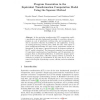Free Online Productivity Tools
i2Speak
i2Symbol
i2OCR
iTex2Img
iWeb2Print
iWeb2Shot
i2Type
iPdf2Split
iPdf2Merge
i2Bopomofo
i2Arabic
i2Style
i2Image
i2PDF
iLatex2Rtf
Sci2ools
ERSHOV
2006
Springer
2006
Springer
Program Generation in the Equivalent Transformation Computation Model Using the Squeeze Method
In the equivalent transformation (ET) computation model, a specification provides background knowledge in a problem domain, a program is a set of prioritized rewriting rules, and computation consists in successive reduction of problems by rule application. As long as meaning-preserving rewriting rules, called ET rules, with respect to given background knowledge are used, correct computation results are guaranteed. In this paper, a general framework for program synthesis in the ET model is described. The framework comprises two main phases: (1) equivalent transformation of specifications, and (2) generation of a program from an obtained specification. A method for program generation in the second phase, called the squeeze method, is presented. It constructs a program by accumulation of ET rules one by one on demand, with the goal of producing a correct, efficient, and non-redundant program.
Background Knowledge | Equivalent Transformation | ERSHOV 2006 | ET Rules | Theoretical Computer Science |
Related Content
| Added | 22 Aug 2010 |
| Updated | 22 Aug 2010 |
| Type | Conference |
| Year | 2006 |
| Where | ERSHOV |
| Authors | Kiyoshi Akama, Ekawit Nantajeewarawat, Hidekatsu Koike |
Comments (0)

